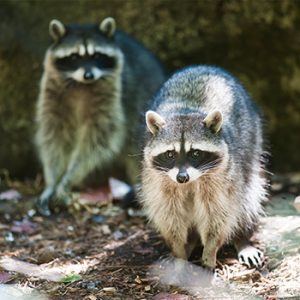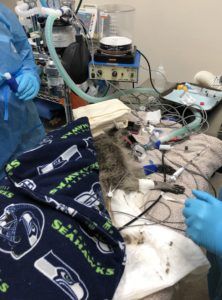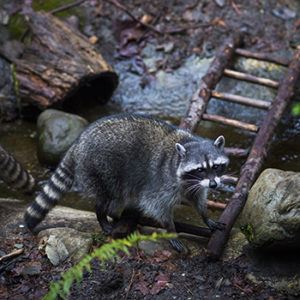 In the raccoon habitat at Northwest Trek, McKenna and McChord are snuggled together, gently licking and nibbling each other’s gray-white fur. The pace is calm, the grooming serene. You would never know that one of these raccoons had cancer – and that well-being is exactly what their keepers and veterinarians are striving for.
In the raccoon habitat at Northwest Trek, McKenna and McChord are snuggled together, gently licking and nibbling each other’s gray-white fur. The pace is calm, the grooming serene. You would never know that one of these raccoons had cancer – and that well-being is exactly what their keepers and veterinarians are striving for.
McKenna, the eight-year-old female of the duo, has bladder cancer, but thanks to the very best of therapies and ongoing care, she’s as content as she can be, hanging out with the animal she’s closest to.
“We first noticed her straining, with some blood in her urine, in May,” says Northwest Trek veterinarian Dr. Allison Case. “So we tested samples and took x-rays, and finally the ultrasound confirmed that she had transitional cell carcinoma.”
Going through chemotherapy

A tumor in your bladder isn’t good news for anyone. Located where McKenna’s is, it can grow and block the flow of waste liquid out of the body from the kidneys. So Case decided, immediately after the ultrasound, to give a 20-minute dose of IV chemotherapy, while McKenna was already under anesthetic at Summit Veterinary Hospital (a partner location).
She recovered well, and after four weeks was given a five-day course of oral chemotherapy. Keepers worked hard and creatively to find tempting food they could put the medication into, three times a day: not an easy task for a raccoon who wasn’t feeling well.
“Jelly, cream, anything we could think of that might be appealing to her,” says keeper Wendi Mello. She and fellow keeper Miranda Mauck even pulled their lunches apart to find something McKenna might enjoy eating. “Finally we discovered she liked canned whipped cream – along with Lactaid, so her stomach wasn’t upset.”
The result made everyone happy.
“She’s been doing really well, so much so that we could put her back in the exhibit,” says Case. “No straining, no more blood. She’s improved so much.”
The power of companionship
 And the best part, for McKenna, was reuniting with her lifelong companion, male raccoon McChord.
And the best part, for McKenna, was reuniting with her lifelong companion, male raccoon McChord.
Born April 2011 (and possibly in the same litter), the two raccoons were rescued as orphans, growing up together in the wildlife rehabilitation center. They moved together to their forever home at Northwest Trek, and have been inseparable ever since. On any given day, guests can see the pair roaming their habitat, exploring new enrichments with their delicate, sensitive fingers or just snuggling together in the den to sleep.
“Conspecific enrichment (spending time with another animal of the same species) is so important for this species, and especially for McKenna,” explains Case. “The companionship, the contact. It’s critical for a full life.”
McKenna will continue to receive oral chemotherapy for five days every month, and Case is also considering photodynamic therapy, a special treatment that uses drugs activated by a light shone through a scope in the bladder.
It’s all part of Northwest Trek’s care for every animal: large, small, rare or commonplace.
“Caring for a sick animal is maybe the hardest thing we do as keepers, both physically and mentally,” explains Mello. “But it’s by far the most rewarding. That’s what we do.”
Right now, though, McKenna is clearly unfazed by the cancer her team is fighting for her. She’s just happy to be back with her companion.